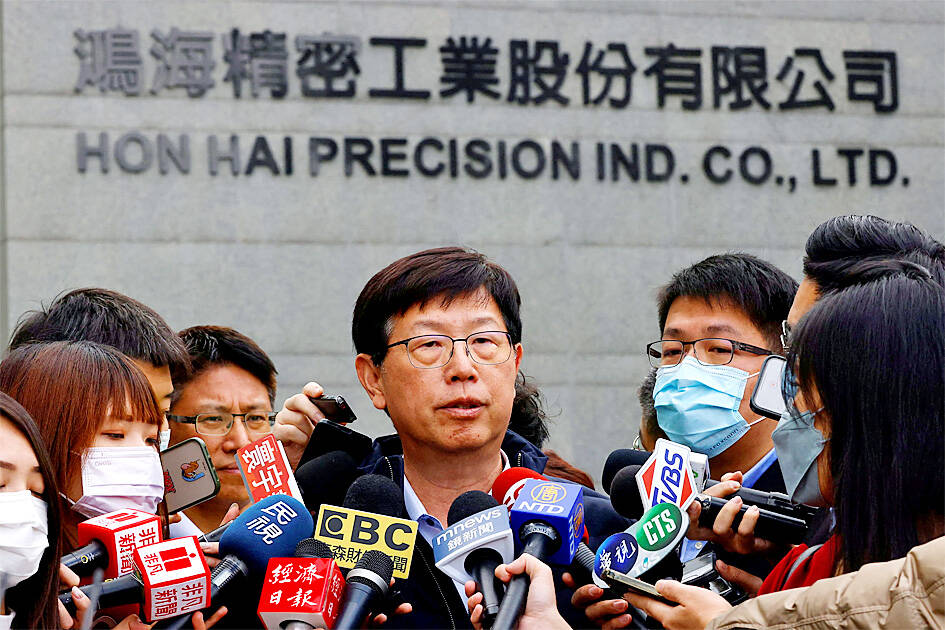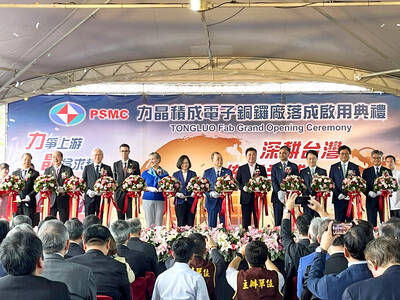Hon Hai Precision Industry Co (鴻海精密), a major iPhone assembler, yesterday said its net profit last quarter plummeted 56 percent annually after it booked a substantial non-operating loss from Sharp Corp, in which it holds a 34 percent stake.
Net profit fell to NT$12.83 billion (US$417.4 million) in the first three months of this year, compared with NT$29.45 billion in the same period last year, dragged by an asset loss of NT$17.3 billion from Sharp.
Excluding the non-operating item, Hon Hai’s operating profit rose 11 percent annually to NT$40.52 billion, from NT$36.67 billion a year earlier.

Photo: Ann Wang, Reuters
Gross margin and operating margin climbed to 6.04 percent and 2.77 percent respectively, from 6.02 percent and 2.61 percent a year earlier.
As the biggest single investor of Sharp, Hon Hai has asked the Japanese electronics company to improve its operations and financial situation to protect the interests of Hon Hai shareholders, company chief financial officer David Huang (黃德財) told investors via teleconference.
Hon Hai does not rule out asking for a reshuffle of Sharp’s management team, Huang said.
Hon Hai has accumulated gains of NT$40 billion since investing in Sharp in 2016, he said.
Compared with the final quarter of last year, Hon Hai’s net profit dipped 68 percent from NT$39.98 billion.
Hon Hai expects revenue to decline this quarter both quarterly and annually, as the COVID-19 pandemic-driven consumption of consumer electronics has ended and demand outlook remains dim, due to an ongoing inventory correction, company chairman Young Liu (劉揚偉) told investors.
Seasonal factors also need to be considered, as the second quarter is usually a slack period, he said.
Hon Hai expects demand for its consumer electronics to decline sequentially this quarter, he added.
Demand for its cloud and networking products and computing products would be flat on a quarterly basis, while demand for components and other products would grow sequentially, he added.
For the whole of this year, revenue would be little changed from last year, Liu said, maintaining his forecast from three months ago, citing the impact of geopolitical tensions, high inflation and macroeconomic uncertainty.
“As visibility remains low, we are conservative about the business outlook,” Liu said.
As enterprises have scaled back server demand, Hon Hai cut its full-year forecast for the cloud and networking business to an annual contraction, he said.
Ongoing inventory digestion has also contributed to the downward revision, he added.
Regarding the setback in the company’s US$170 million partnership with Lordstown Motors Corp, Liu said Hon Hai would make good use of its electric vehicle (EV) factory in Ohio, no matter how its dispute with the US firm is resolved.
Earlier this month, Lordstown Motors said that it might be forced to cease operations after Hon Hai said it is prepared to pull out of a production partnership with the EV maker.
“We remain open to continued dialogue to find the best solution for each other,” Liu said.
The deal with Lordstown Motors, along with the US$230 million purchase of the former General Motors Co factory in Ohio, is part of Hon Hai’s plan to strengthen its position as a provider of EV production capacity and technology.
“We are taking a multicustomer approach to optimize and allocate this capacity we have in Ohio,” Liu said, adding that the US’ recently enacted Inflation Reduction Act has made the factory more attractive.
Hon Hai has set ambitious targets for its auto business, betting that it can capture 5 percent market share by 2025.
“The next two years are a period of active courtship of new customers,” Liu said.
Additional reporting by Bloomberg

ARTIFICIAL INTELLIGENCE: The chipmaker last month raised its capital spending by 28 percent for this year to NT$32 billion from a previous estimate of NT$25 billion Contract chipmaker Powerchip Semiconductor Manufacturing Corp (力積電子) yesterday launched a new 12-inch fab, tapping into advanced chip-on-wafer-on-substrate (CoWoS) packaging technology to support rising demand for artificial intelligence (AI) devices. Powerchip is to offer interposers, one of three parts in CoWoS packaging technology, with shipments scheduled for the second half of this year, Powerchip chairman Frank Huang (黃崇仁) told reporters on the sidelines of a fab inauguration ceremony in the Tongluo Science Park (銅鑼科學園區) in Miaoli County yesterday. “We are working with customers to supply CoWoS-related business, utilizing part of this new fab’s capacity,” Huang said, adding that Powerchip intended to bridge

Microsoft Corp yesterday said that it would create Thailand’s first data center region to boost cloud and artificial intelligence (AI) infrastructure, promising AI training to more than 100,000 people to develop tech. Bangkok is a key economic player in Southeast Asia, but it has lagged behind Indonesia and Singapore when it comes to the tech industry. Thailand has an “incredible opportunity to build a digital-first, AI-powered future,” Microsoft chairman and chief executive officer Satya Nadella said at an event in Bangkok. Data center regions are physical locations that store computing infrastructure, allowing secure and reliable access to cloud platforms. The global embrace of AI

RIDING AI WAVE: : Most of its NT$15bn capital budget would be spent on packaging technologies used in AI and HPC chips and advanced testing technology, it said Chip testing and packaging service provider Powertech Technology Inc (PTI, 力成科技) plans to increase this year’s capital expenditure by 50 percent to expand capacity to meet growing demand for advanced memorychips used in artificial intelligence (AI) products. The company proposed to spend NT$15 billion (US$460.94 million) to expand advanced capacity and equipment, compared with a budget of NT$10 billion it planned three months ago. “We are seeing a recovery in market demand as well as new business opportunities. We will spend heavily on advanced packaging” equipment, Powertech chief executive officer Boris Hsieh (謝永達) told investors on Tuesday. “We will focus on ramping

Qualcomm Inc, the world’s biggest seller of smartphone processors, gave an upbeat forecast for sales and profit in the current period, suggesting demand for handsets is increasing after a two-year slump. Revenue in the three months ended in June will be US$8.8 billion to US$9.6 billion, the company said in a statement Wednesday. Excluding certain items, earnings will be US$2.15 to US$2.35 a share. Analysts had projected sales of US$9.08 billion and earnings of US$2.16 a share. The outlook signals that the smartphone market has begun to bounce back, tracking with Qualcomm’s forecast that demand would gradually recover this year. The San